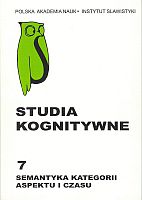Lexical and grammatical aspects of translating culture: a cognitive perspective
Lexical and grammatical aspects of translating culture: a cognitive perspective
Author(s): Mateusz-Milan StanojevićSubject(s): Language and Literature Studies
Published by: Instytut Slawistyki Polskiej Akademii Nauk
Summary/Abstract: Various cognitive theories of language of the first and second wave (cf. Varela, Thompson and Rosch 1992) claim that the mind is inextricably connected with language. This interconnection may be modular, as is the case with different versions of generative grammar and some semantically based theories of language (such as Jackendoff 1983, Descl´es 1990), and non-modular, as in some varieties of cognitive grammar (cf., e.g., Langacker 1987, Langacker 1991). Semantically based modular theories and non-modular theories share the cognitive hypothesis, which claims that language and various cognitive abilities are intertwined (Lakoff 1990) as well as the view that meaning is the basis of all aspects of language. The most significant difference concerns the way in which they model the process of establishing meaning: whereas the former claim that the language — mind interface consists of mechanisms that may be different depending on the level of analysis (despite the fact that all are motivated by semantic factors), the latter maintain that the same mechanisms pervade all levels, thus theorizing the existence of a symbolic lexis — grammar continuum, and making the division into linguistic and representational levels a matter of theory
Journal: Cognitive Studies | Études cognitives
- Issue Year: 2006
- Issue No: 7
- Page Range: 75-88
- Page Count: 14
- Language: English

